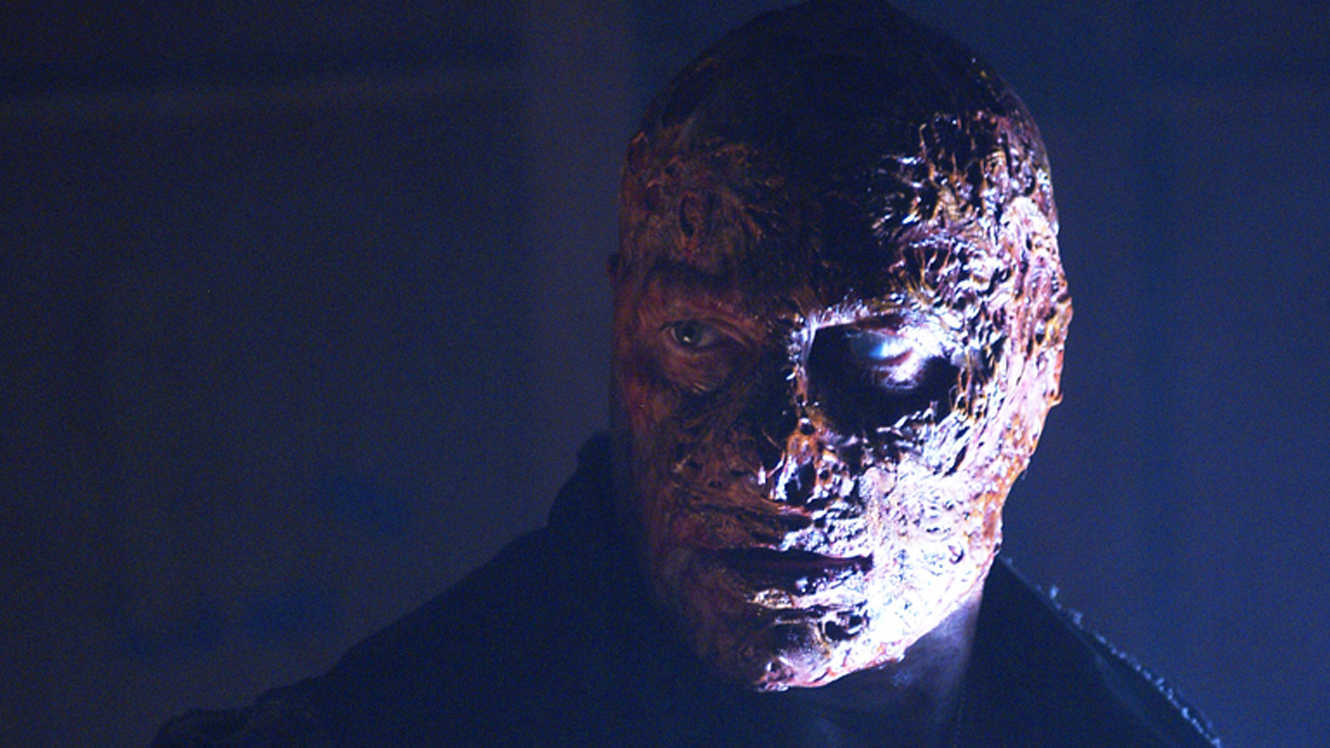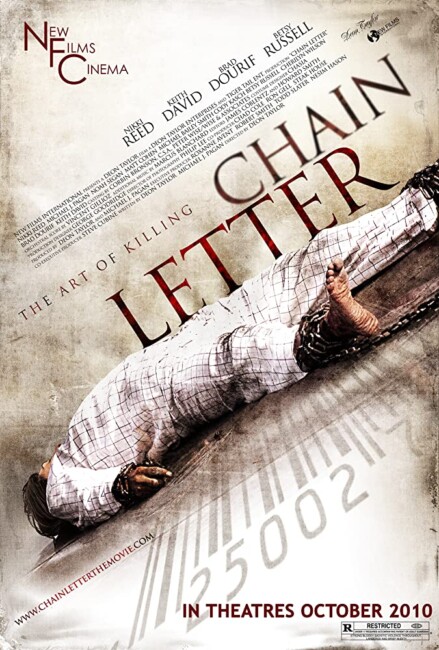USA. 2010.
Crew
Director – Deon Taylor, Screenplay/Producers – Michael J. Pagan & Deon Taylor, Photography – Philip Lee, Music – Vincent Gillioz, Additional Music – Marcus Blanchard, Special Effects Supervisor – Jim Bilz, Makeup Effects – Dean Jones, Production Design – George Goodridge. Production Company – Deon Taylor Enterprises/Tiger Tail Ent.
Cast
Nikki Reed (Jessie Campbell), Keith David (Detective Jim Crenshaw), Cody Kasch (Neil Conners), Michael J. Pagan (Michael Grant), Cherilyn Wilson (Rachel Conners), Noah Segan (Dante), Matt Cohen (Johnny Jones), Brad Dourif (Mr Smirker), Betsy Russell (Sergeant Hamill), Charles Fleischer (Frank Wiggins), Michael Bailey Smith (Chain Man), Madison Bauer (Jane Campbell), Phil Austin (Jeff Campbell), Terrence Evans (Mr Bradford), Eliot Benjamin (Kevin Daniels)
Plot
Several students at Brinkman High School suddenly receive chain emails and text messages saying they will die if they do not forward them to five other people. Whenever someone ignores this and deletes the message, a hulking figure with a bandaged face appears and brutally kills them using chains. As the killings continue, police try to find a connection. Clues appear to lead to the Technology Terrorists, the remnants of a cult that are determined to use modern technology against people.
Chain Letter was the fourth directorial outing for African-American director/producer/writer Deon Taylor who is shaping up as a regular genre contributor. Taylor first appeared with the slasher film 7eventy 5ive (2007) and went onto direct the non-genre comedy The Hustle (2008) and the horror anthology Nite Tales: The Movie (2008), which was spun out into a short-lived tv series Nite Tales: The Series (2009), also directed/produced by Taylor. Chain Letter was followed by the non-genre Supremacy (2014), the parody film Meet the Blacks (2016), the thrillers Black and Blue (2019) and Fatale (2020) and in genre material the horror films Traffik (2018), The Intruder (2019), The House Next Door (2021) and Fear (2023).
Chain Letter is one of those films that leave you wondering why it was made. It gives the impression of having been made without Deon Taylor and his co-writer/co-producer/supporting actor Michael J. Pagan having any clear concept of what they were making a film about – if they did, they certainly do little to convey it to the audience. The film feels as though Taylor and Pagan had a vague idea of wanting to say something about how the interconnectivity revolution of the 00s was starting to overtake the world – the prevalence of internet communication, online gaming, the geometric growth in the use of cellular phones – and simply grafted this onto the formula of a slasher film.
One’s hopes for Chain Letter sink from the opening credits sequence that edits together a frenetic montage of images and headlines about GPS tracking, identity phishing, havoc wreaked by hackers, images of the Unabomber, dubious connections to terrorism and mocked-up headlines like ‘Is Technology Ruining America’, even rather laughably the spectre of the Y2K bug, while moments later Brad Dourif’s professor gives simplistically minded lectures on information privacy. This seems like a vision of technological alarmism that comes from people who know very little about said technology beyond how to answer emails – there is a laughable scene where the characters suddenly realise that GPS means that anybody can be tracked and one character explains “You phone has a bill that goes to a company – it has your address on it,” which everyone reacts to with shock realisation and this is then somehow taken to explain that the killer can track anybody anywhere.

Yet despite all of this, we cannot even be sure if Taylor and Pagan are saying that the reliance on such technology is a bad thing – for all the film’s setting itself around such technology prevalence and the alarmist associations made in the opening scenes, Chain Letter has astonishingly little to say about it.
Outside of the vague themes about technology, all that we have is the good old standby of the modern teens in peril film, where Deon Taylor follows a tried and true slasher formula. Certainly, Taylor makes the film as gory as hell. There is a particularly nasty scene where Matt Cohen gets the top of his head sawed off via a chain ripped through his mouth. Later Noah Segan has his head splattered when the killer drops the engine block of a car onto him.
However, there is no explanation of who the killer is or why they are bandaged. For reasons that are never explained, the killer wields chains as a motif – the only reason for this seems to be the rather absurd homonymic one where this is meant to connect up to the fact that they also send out chain letters. For that matter, the idea of killing all people who fail to send out chain letters is absurd – if you consider the idea of killing everyone on a list who fails to send five copies out, then mathematics say that within a matter of days you would need an army of killers to keep up with the victim count. The film reaches an abrupt ending that seems to come to a halt with an entire third act missing and lacks any proper confrontation with the cult behind the killings, or even opportunity to expose and explain who or what they are.
Trailer here


